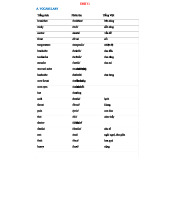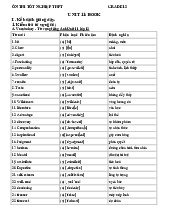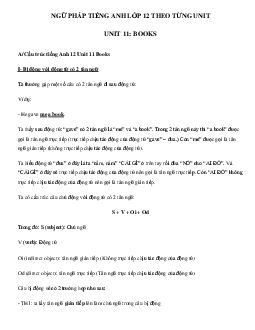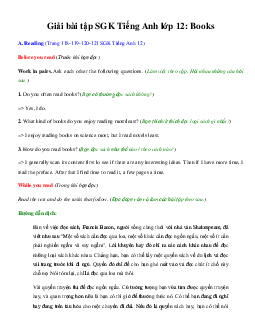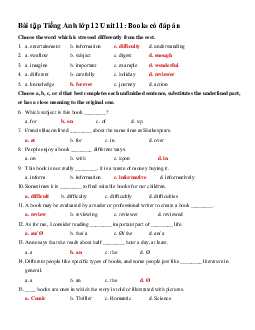









Preview text:
BÀI TẬP TIẾNG ANH LỚP 12 THEO TỪNG UNIT
UNIT 11: BOOKS CÓ ĐÁP ÁN
A. Nội dung bài tập tự luận Unit 11 lớp 12 Books
I. Circle the word with a different consonant sound. 1. subject digest giant guess journey 2. chew check character which cheap 3. words book bits dips taste 4. action picture potential information fiction 5. pleasure television preserve usual decision 6. Shakespeare surely short sugar silence 7. brochure achieve chamber purchase teacher 8. enough photo fiction through rough 9. what whose which why when 10. author without together though this
II. Fill in each blank with one appropriate word to complete the passage.
Books are written to (1).....................knowledge and good books enrich the mind. By butting
(2).....................under the influence of superior mind, we improve our mental powers. Through good
(3).....................we learn that people everywhere are the (4).....................in all ages and in all classes.
This knowledge improves our love (5).....................others and helps us to live in peace with them. We
also (6).....................that the world was made not only for man (7).....................but for every creature
that can feel hunger and (8).....................warmth and cold.
Though it may be possible for us to travel (9).....................the world and see the things happening today,
it is (10).....................possible for us to see the things that happened in the past. But good books
(11).....................us to see not only into the most remote regions of the world today but also the world
in (12).....................our ancestors lived.
III. Put the following into the passive voice. Do not mention the agent unless it seems necessary.
1. You can't wash this dress; you must dry-clean it.
...............................................................................................
2. You should open the wine about three hours before you use it.
...............................................................................................
3. Members may keep books for three weeks. After that they must return them.
...............................................................................................
4. Men with slide rules used to do these calculations; now a computer does it.
...............................................................................................
5. Passengers shouldn't throw away their tickets as inspectors may check these during the journey.
...............................................................................................
6. We shall have to tow the car to the garage.
...............................................................................................
7. Visitors must leave umbrellas and sticks in the cloakroom.
...............................................................................................
8. You should have taken those books back to the library.
...............................................................................................
10. You mustn't move this man; he is too ill. You'll have to leave him here.
...............................................................................................
11. When they have widened this street the roar of the traffic will keep residents awake all night.
...............................................................................................
12. You will have to pull down this skyscraper as you have not complied with the town planning regulations.
...............................................................................................
13. They ought to have reported the accident to the police.
...............................................................................................
14. He recommends fitting new tyres.
...............................................................................................
15. He suggested allowing council tenants to buy their houses.
...............................................................................................
IV. Complete the sentence with the appropriate forms of the verbs in the list. Use each verb only
once. Some of the sentences are active and some are passive.
pollute sign distinguish participate tell discover wear
establish wrap replace read scrub forget repeat trade
1. Jack has a right to know. He ought to...............the news immediately. If you don't do it, I will.
2. I have no patience with gossips. What I told Bill was a secret. He shouldn't have...............it to you.
3. Use this brown paper and tape. A package has to...............carefully before it is mailed. Otherwise, the post office won't send it.
4. I don't know why Jessica wasn't at the meeting. She must have...............about it.
5. The ancient ruin may have...............as early as 1792. The historical record is difficult to interpret.
6. The games are open to anyone who wants to join in. Everyone can............... in them.
7. This burnt out light bulb should have...............days ago. Could you do it for me?
8. You'd better not drink that river water. It could............... .
9. I think everyone should...............this paperback on the economic crisis. It contains information that everyone should have.
10. Surgeon must...............their hands thoroughly with disinfectant soap and hot water before they enter the operating room.
11. Your passport is supposed to................ It is invalid without your signature.
12. A bald eagle can...............from the other large birds by its while head and while tail.
13. If you don't want to work tonight, you ought to...............work shifts with Emily.
14. When you are on duty, your uniform must...............at all times.
15. A university may...............in outer space before long.
V. Complete these sentences with appropriate passive or active forms of the verbs.
1. The economic situation in the region...............(deteriorate) quite sharply over the last years.
2. The story of Father Christmas...............(tell) to young children to explain the presents they receive.
3. A new drug...............(develop) to combat asthma in small children at the moment.
4. A special messenger...............(deliver) the package before I got to the office.
5. A number of political prisoners...............(release) within the next few days.
6. The impact of the earthquake yesterday...............(feel) by people who lived hundreds of kilometers from the epicenter.
7. ...............you already...............(accept) by this university when you heard about the other scholarship?
8. Kim wants very badly to make the Olympic team next year. She............... (train) hard for the last two years.
9. Martin Johnson...............(appoint) team captain for the whole of the World Cup.
10. Many of us take water for granted in our daily lives, but people who live in the desert...............(not
use) water carelessly. To them each drop is precious.
11. I got into a taxi quickly because I...............(follow) by two strange men. As soon as I got into the
taxi, I...............(feel) a little safer.
12. Mark is a genius. By the time he graduated, he...............(offer) jobs by a dozen computer companies.
13. Only coffee and dessert...............(serve) at the reception yesterday.
14. In recent years, the goverment...............(impose) pollution controls on automobile manufacturers.
Both domestic and imported automobiles must ...............(equip) with anti-pollution devices.
15. Accoding to present company policy, bonuses for most sales............... (give) to the staff at the end of July every year.
VI. Turn the following into passive if the result is acceptable English. If passive is unacceptable, write 'no passive'.
1. Has anyone cost these repairs in advanced?
2. Modern art frequently resembles children's art.
3. Somebody really ought to look into this problem further.
4. Do you feel you lack access to further information?
5. Why are people always laughing at me?
6. No one is ever going to account for that missing money.
7. My new car holds three people comfortably in the back.
8. Nobody is to interfere with these boxes.
9. The school comprises the main school building and two accommodation blocks.
10. They seem to have looked after the house quite well.
11. When my brother's tailor measured him for a new suit, he told him that he'd put on a lot of weight.
12. You need to fit a new washer to that tap.
13. The weekend they suggest will suit me perfectly.
14. They are holding the three hostages in dreadful conditions.
15. Cheap clothes never seem to fit me properly.
VII. Write the passage, using the cues given.
Agatha Miller/ bear/ 15 September 1890/ Torquay/ southwest England. Better known/ Mrs. Agatha
Christie/ she/ write/ altogether 78 mystery novels and 19 plays.
Very few other crime writers/ write/ more books/ this, and few/ become/ so immensely popular.
Ever since/ she/ publish/ first novel, the Mysterious Affair at Styles/ 1920/ her books/ never be/ out of
print. They/ translate/ all over the world, and perhaps surprising/ her sales/ actually increase/ since/ she/
die/ 1976. For a short time after her death/ they/ fall/ so it/ be perhaps/ screen/ revive/ her popularity.
People/ enjoy/ Agatha Chrities's story – telling/ years, and her popularity/ currently/ seem/ higher/ it/
ever be. It/ not be/ of course/ first time/ author/ become/ more popular/ death/ life.
B. Đáp án bài tập tiếng Anh 12 Unit 11 Books
I. Circle the word with a different consonant sound.
1 - guess; 2 - character; 3 - words; 4 - picture; 5 - preserve
6 - silence; 7 - brochure; 8 - through; 9 0 whose; 10 - author
II. Fill in each blank with one appropriate word to complete the passage.
1 - provide; 2 - ourselves; 3 - books; 4 - same; 5 - of; 6 - understand/ learn;
7 - alone; 8 - thirst; 9 - throughout; 10 - not; 11 - help; 12 - which;
III. Put the following into the passive voice. Do not mention the agent unless it seems necessary
1. This dress can't be washed; it must be dry-cleaned.
2. The wine should be opened about three hours before it is used.
3. Books may be kept for three weeks. After that they must be returned.
4. These calculations used to be done by men; now they are done by computer.
5. Tickets shouldn't be thrown away as they may be checked during the journey.
6. The car will have to be towed to the garage.
7. Umbrellas and sticks must be left in the cloakroom.
8. Those books should have been taken to the library.
9. Articles (which have been) bought during the sale cannot be exchanged.
10. This man mustn't be moved; he is too ill/ he is too ill to be moved. He will have to be left here.
11. When this street has been widened the residents will be awaked by the roar of the traffic.
12. This skyscraper will have to be pulled down as the town planning regulations have not been complied with.
13. The accident ought to have been reported to the police.
14. He recommends new tyres should be fitted.
15. He suggested that council tenants should be allowed to buy their houses.
IV. Complete the sentence with the appropriate forms of the verbs in the list. Use each verb only
once. Some of the sentences are active and some are passive. 1. be told 6. participate 11. be signed 2. repeated 7. been replaced 12. be distinguished 3. be wrapped 8. be polluted 13. trade 4. forgotten 9. read 14. be worn 5. been discovered 10. scrub 15. be established
V. Complete these sentences with appropriate passive or active forms of the verbs.
1. has deteriorated/ deteriorated
9. has been appointed/ was appointed 2. is told 10. do not use 3. is being developed
11. was being followed – felt 4. had delivered 12. had been offered
5. will be released/ are being released 13. were served 6. was feft
14. has imposed – be equipped 7. had... been accepted 15. are given 8. has been training
VI. Turn the following into passive if the result is acceptable English. If passive is unacceptable, write 'no passive'.
1. Have these repairs been cost in advance? 2. No passive
3. This problem really ought to be looked into further. 4. No passive
5. Why am I always being laughed at?
6. That missing money is never going to be accounted for. 7. No passive
8. These boxes are not to be interfered with. 9. No passive
10. The house seems to have been quite well looked after.
11. When my brother was measured for a new suit, he was told by the tailor that he'd put on a lot of weight.
12. A new washer needs to be fitted to that tap/ That tap needs to have a new washer fitted. 13. No passive
14. The three hostages are being held in dreadful conditions. 15. No passive
VII. Write the passage, using the cues given.
Agatha Miller was born on 15 September 1890 in Torquay in southwest England. Better known as Mrs
Agatha Christie, she wrote altogether 78 mystery novels and 19 plays.
Very few other crime writers have written more books than this, and few have become so immensely popular.
Ever since she published her first novel, The Mysterious Affair at Styles in 1920, her books have never
been out of print. They have been translated all over the world, and perhaps surprisingly, her sale have
actually increased since she died in 1976. For a short time after her death they fell, so it was perhaps the
screen that revived her popularity.
People have enjoyed Agatha Christie's story-telling for years, and her popularity currently seems higher
than it has ever been. It is not of course the first time that an author has become more popular in death than in life.
